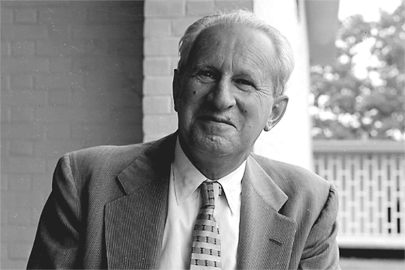One-Dimensional Man at 50: Conference explores Marcuse's work
Scholars from around the world to converge Oct. 1 and 2

Herbert Marcuse arrived at Brandeis in 1954 with almost no scholarly reputation. He'd never held a full-time teaching post, hadn't published a book since 1941, and had spent much of his professional career with the U.S. government.
He left in 1965 after publishing three books, establishing himself as a supporter of student protests, an advocate of the sexual revolution and a leading intellectual of "the New Left."
"It was an unpredictable — even unimaginable — career," said Steve Whitfield PhD'72, the Max Richter Professor of American Civilization. "In addition to Eleanor Roosevelt and Leonard Bernstein, he became one of the most distinguished people to teach at Brandeis in the first two decades. He was a figure of truly international prominence."
This year marks the 50th anniversary of the publishing of "One-Dimensional Man," considered Marcuse’s most influential work. In recognition of the anniversary, Brandeis is holding a conference, The Many Dimensions of Herbert Marcuse, Oct. 1 and 2.
A theorist of the Frankfurt School, Marcuse emigrated from Germany to the United States in 1934 and became a U.S. citizen in 1940. Marcuse worked for the government through World War II until 1951, then held part-time research posts at Columbia and Harvard. He arrived at Brandeis in the fall of 1954 and began his precipitous ascent as a scholar.
Marcuse earned a towering reputation beyond campus, but former students remember him as a marvel in the classroom, as well. Jules Bernstein '57 took two full-year courses taught by Marcuse.
"He was a brilliant teacher," Bernstein recalled. "He’d lecture for three hours a week entirely without notes, and his prose was immediately publishable."
Bruce Litwer '61 said Marcuse sought to personally connect with his students and had a subtle, sharp wit.
"He had a remarkable mind, I don't have any doubt about that," Litwer said. "He also possessed a dry, wonderful sense of humor. He would say things with a bit of a smile, but he probably meant them."
The conference will feature panel discussions with scholars from around the U.S. and Europe. Among the faculty from Brandeis participating: Laura Miller, Steve Dowden, Caren Irr, Eugene Sheppard, Benjamin Steele, Richard Gaskins, Whitfield and Patrick Gamsby, a lecturer in the history of ideas program who recently discovered an early manuscript of "One-Dimensional Man." Martin Jay and Douglas Kellner, considered the leading authorities on Marcuse’s work, will make keynote addresses.
Registration and a full list of events is available at the conference's website.
Categories: Humanities and Social Sciences, Research





